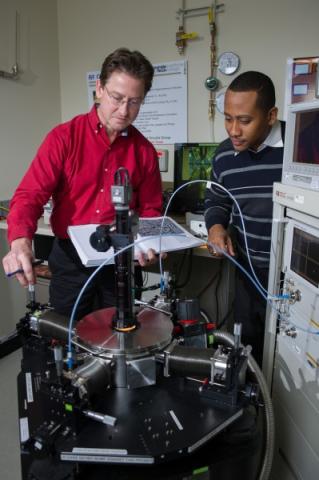Engineering faculty and researchers from the Georgia Tech Research Institute (GTRI) are partnering in a new program that supports Georgia Tech’s strategic defense technology priorities.
Some of the most complex problems facing U.S. national security are tackled every day at Georgia Tech, with research ranging from cyber forensics for adversarial attacks to health care tools that monitor soldiers in the field. Now, engineering faculty and researchers from the Georgia Tech Research Institute (GTRI) are partnering in a new program that supports Georgia Tech’s strategic defense technology priorities.
The inaugural GTRI Graduate Student Fellowship Program is a competitive program for high-caliber Georgia Tech graduate students working in GTRI strategic research areas. Academic faculty and GTRI researchers worked together to create proposals that closely aligned with GTRI’s strategic initiatives. Soon, graduate students will be recruited to work on these research projects with fully funded fellowships.
“GTRI has an important mission to support our nation through solving some of the hardest problems in national security, and we believe that we are best able to achieve our mission when we fully and broadly leverage the deep expertise that exists in the academic units at Georgia Tech,” said Mark Whorton, chief technology officer at GTRI. “It is central to our identity and necessary for our success to fully leverage the talent within the academic units and elevate our reputation as a leading university-affiliated research institute.”
The program will build upon existing relationships between academic faculty and GTRI researchers, further developing relationships and long-term research collaborations that will advance projects related to national security.
“This is a unique program that pairs academic faculty with technology researchers to tackle the challenges of national security,” said Krista Walton, associate dean for research and innovation in the College of Engineering. “We are excited to partner with GTRI and offer the vast knowledge base of our engineers in order to enable research that advances our national security efforts.”
